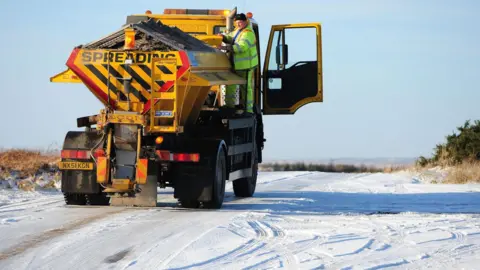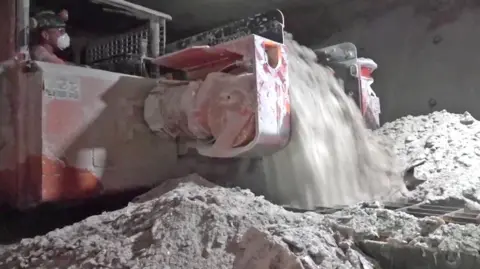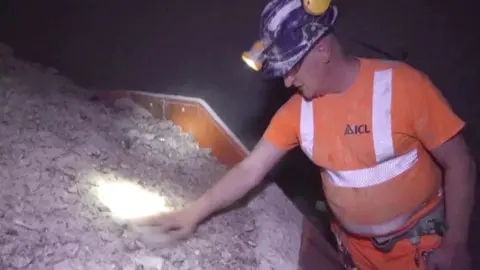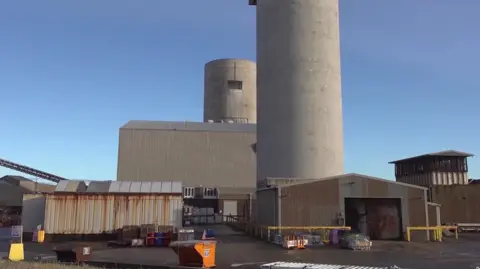Inside the Yorkshire mine where England's gritters get their salt
 PA Media
PA MediaAs cold weather takes hold across the country, gritters will be out in force ahead of the expected snow and ice. But where exactly does the salt come from that helps keep traffic moving?
Almost a mile under the North Sea, in temperatures which can reach 40C (104F), miners dig out the gritting salt which is used to add traction on England's roads in wintry weather and for de-icing pavements.
The miners, from the ICL Boulby Mine near the seaside tourist village of Staithes in North Yorkshire, extract more than 350,000 tonnes of rock salt each year.
It is one of only two places in England where the salt is mined - from deposits which were formed millions of years ago when a swathe of northern Europe was covered by sea.
 PA Media
PA MediaOver time, the seawater evaporated, leaving vast salty deposits that were gradually covered over.
Nowadays, some of those rock salt deposits can be found at a depth of about 330ft (100m), while others are much deeper - well over a mile (1.6km) underground.
Thomas Edwards, ICL Boulby's chief geologist, said the salt was "hauled out by people working 24 hours a day, in the dark, beneath the sea".
Rock salt is used for winter highway maintenance as salt lowers the freezing point of water to below 0C (32F).
This means that when salt is spread over a road or a footpath, it either melts the snow and ice as it dissolves, or it helps prevent ice forming.
Mr Edwards said during any cold snap, most gritters in the north of England would probably be filled by salt mined at Boulby.
"I like to tell people that when their cars are a little bit grubby when the roads have been gritted in the winter, that's 260 million-year-old dirt that's dirtying your cars," he explained.
"It's really quite something to think about. And a bit of a positive rather than, 'what's all this grub on my car?'."
 PA Media
PA MediaThe two shafts at Boulby are about 3,610 ft (1,100m) deep and lead to hundreds of miles of roadways which descend further down into the earth.
When it opened in 1973, Boulby was the deepest mine in Europe, and it remains the deepest in the UK.
It is so deep it is home to one of the world's leading projects trying to find dark matter - the mystery substance that physicists believe makes up most of the universe - as half a mile (1km) of rock blocks out most other "normal" particles.
Opened as a potash mine, the rock salt was produced as the miners pushed through the deposits to get to the fertiliser product.
Although the facility now mines a different fertiliser - polyhalite - Boulby still produces hundreds of thousands of tonnes of rock salt.
The exact amount it produces varies, depending on how harsh a winter the country is experiencing.
According to National Highways, about 215,000 tonnes of salt is used on average each winter on motorways and major A-roads.
The good news for drivers and pedestrians is that there is no shortage of rock salt available at Boulby.
According to Mr Edwards, "we have resources to last us many decades, if not centuries".
 PA Media
PA MediaGritters - perhaps using rock salt mined at Boulby - will be out and about on Friday and into the weekend as weather warnings remain in place for northern England, the Midlands and much of Wales from 18:00 GMT on Saturday until midnight on Sunday.
Darren Clark, severe weather resilience manager for National Highways, urged people travelling at the weekend to plan ahead.
"If you are travelling, please plan your journeys, check your vehicle, keep your distance, and reduce your speed," he said.
"Gritters will be out treating our roads around the clock, but it is still important to drive to the conditions and consider packing a snow kit of blankets, food, water and a shovel."
Listen to highlights from North Yorkshire on BBC Sounds, catch up with the latest episode of Look North or tell us a story you think we should be covering here.
